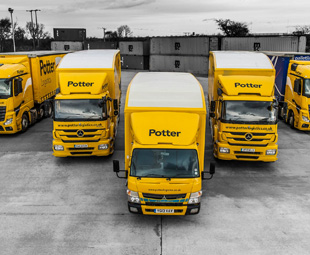What will happen to logistics if the UK leaves the EU?

Today, Britain decides if the United Kingdom (UK) is to become the first country to leave the European Union (EU) of its own accord.
Polls leading up to today indicate the supporters of, and against, the Brexit are almost on a dead level. The transport and logistics industry is especially worried about the consequences of a Brexit, reports TimoCom, Europe’s largest transport platform.
The UK has a special status among the EU member countries, such as maintaining the Pound Sterling, not being a part of the Schengen area, and a high level of economic sovereignty.
At the same time, the UK economy is very closely connected to the EU, which is, without a doubt, its main trading partner. A total of 43,7 percent of exports in 2015 went to EU countries and a total of 53,1 percent of imports were from the EU.
Brexit could become an expensive choice …
Should the Brexit become a reality, it will have a global impact. The UK would exclude itself from approximately 50 EU free trade agreements, which would have to be renegotiated.
In April, American President Barack Obama commented that the British would end up “back in the queue” with regard to new bilateral trade negotiations. Trade barriers would increase the prices of imports and those businesses that depend on imports would feel the impact. Domestic manufacturers that need to export goods could also be affected.
It would affect the rest of Europe as well, says TimoCom. Most likely, all foreign processes and the economy would be hit by the impact of Brexit. Customs control could again become a reality, which would prolong transport times and result in a slower logistics process.
… but it’s not necessarily a worst case scenario
Maria Toft Madsen, country manager Northern Europe at TimoCom, is responsible for the UK. Her prediction on the possible Brexit is somewhat calmer: “Of course the European transport and logistics industry prefer that the UK stays in the EU, but I do not expect a Brexit to become a worst case scenario. In our opinion, a decrease of the freight volume on the transport platform to and from the UK could happen.
“Nevertheless, if it happens, in time the situation will stabilise as an exchange of goods with the UK will continue. Our customers in the EU will, without a doubt, still transport goods to the UK, as they do now with countries like Turkey and Norway.
“The Pound Sterling falling could also lead to an increase in UK exports. Not only a worst case scenario is possible, but, as the whole situation around Brexit is new, of course it raises many questions and uncertainty all across Europe.”
An industry split in two
Uncertainty is the keyword. A survey from the IMHX shows the latest status on the opinion towards Brexit. The dilemma: As an individual, a majority of those asked prefer leaving the EU, but they also believe that it would be better for their company and business to remain in the EU.
When the logistics industry was asked what possible prospects the companies and business would have to face with a Brexit, the majority (38 percent) believe that the Brexit would have a negative impact on business growth, whereas 33 percent indicated it would not have any impact. Only one out of five participants think there will be benefits, if Brexit becomes a reality.
Analysing the discussions, articles and polls, one thing becomes very clear: nothing is certain. As the date of the referendum has come nearer it has become more difficult to predict certainties and trends. One can only hope that, in the end, the UK will be led by well-conceived pros and cons when deciding on this important matter.
Published by
Focus on Transport
focusmagsa




